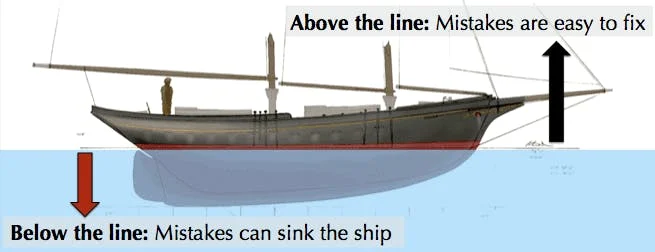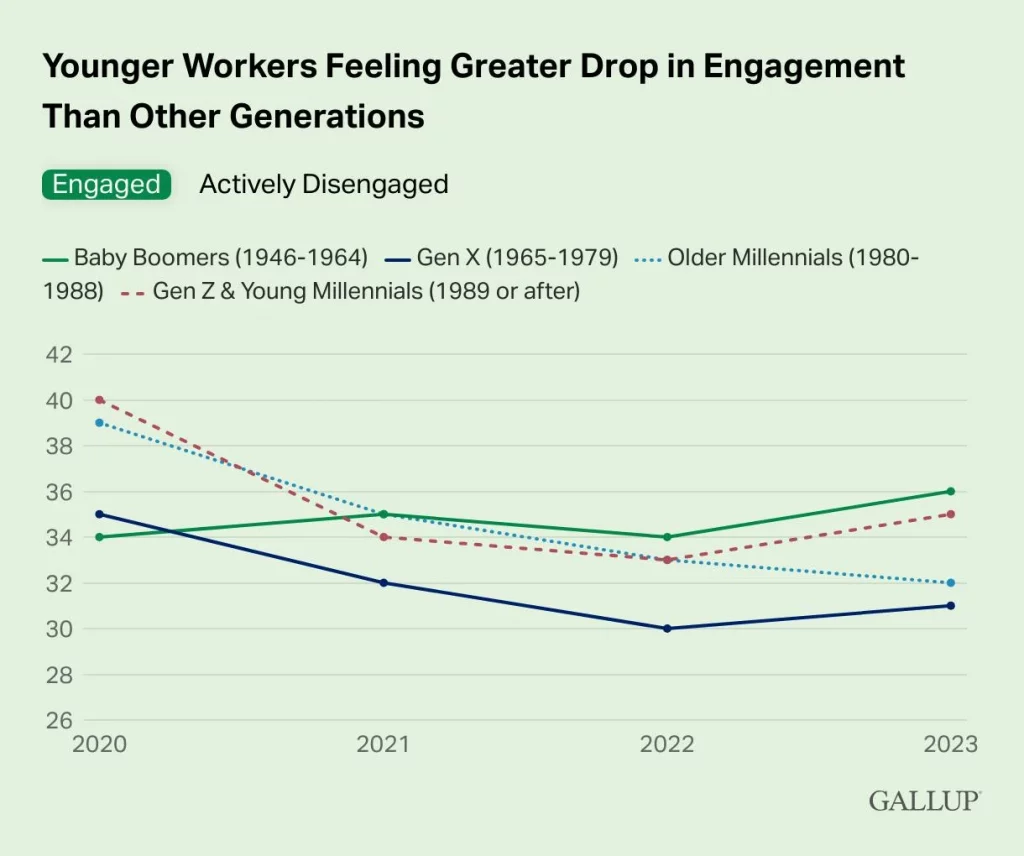The day after Daylight savings time springs forward is always a rough one. I think we all miss that hour of sleep and the circadian rhythm shock is also very real.
However, a day or two later, I'm so glad it's here. The sun setting around 7:30-7:45pm feels so right. It gives you some time to wind down after a workday and feel like there's a real transition before it's dark out.
As spring is here in the Northern hemisphere, it's a great time to look ahead and make some plans.
In today’s edition, we look at some great advice from Rear Admiral Grace Hopper, look at some new data from Gallup on Generational differences in engagement, and announce a special opportunity for leaders like you.
Let’s dive in…
Table of contents:
- 🥘 Food for Thought on a great lesson from Rear Admiral Grace Hopper
- 📰 News & Reports for Managers on Generational Engagement Differences
- ✨ Get Ready for next week's 1 on 1 Master Class cohort
Note: This is a preview of our weekly leadership newsletter, Lighthouse Leadership Weekly (LLW).
To get this sent to your inbox every week, along with our latest long form essays on this blog, you can sign up here.

🥘 Food for Thought
"On many, many, many occasions, you will find that it is easier to apologize than to get permission.
You do it. Then, when somebody comes after you, ...you say, 'Oh gee, I didn't know I wasn't supposed to do that.'
...We've got to move forward. We're going to have to count on our young people to do it. Because we've got to move into the world of the future. And we can’t afford to say…but we’ve always done it that way." - Rear Admiral Grace Hopper, pioneer of computer programming and US Naval officer
I stumbled on this quick video and was amazed to see someone who passed away 30+ years ago (1992) was talking about something we hear commonly today:
“We’ve got to move into the world of the future. And we can’t afford to say…but we’ve always done it that way.”
— Jon Erlichman (@JonErlichman) December 7, 2022
~ Rear Admiral Grace Hopper, who programmed the first computer. pic.twitter.com/W3s87owobw
Do you apologize, or ask for permission?
There are times to play it safe, and there are times to take chances. Do too much of either, and you can get yourself in a lot of trouble.
Always play it safe, and you'll rarely advance.
You'll never take those chances or have the impact that really gets noticed. Maybe you can coast on that, but we're not in a great economy where the middle is all that safe.
Take too many chances, and people will call you reckless.
They won't trust your judgment, because you ignore inherent risks and the chain of command.
You have to strike a balance and develop an instinct for when to make things happen.
Do you encourage your TEAM to apologize, or ask for permission?
As we typically point out, you need to also always look at things not just through a lens of what you do, but also what your team does.
In this case, it's just as important as ever.
If your team is always asking you for permission, you can certainly make sure they don't make any bad mistakes. However, you'll also stifle especially your best, most creative people, and you'll limit yourself to incremental progress, but few or no breakthroughs.
You'll also slow your team's pace significantly.
If they need your permission (and then you seek permission, too), that's a lot of time spent waiting for approval instead of acting. Whether that slows seizing an opportunity or delays responding to a crisis, both reduce the impact of your team, and can frustrate top performers who want to act and crave independence.
At the same time, if your team prefers to act and apologize later, there are plenty of ways that can go wrong, too.
Being unprepared for unintended consequences, stepping on the wrong team or product's toes, or simply making one too many mistakes while trying to move fast can all sink you and your team's reputations.
Especially if you're at a big company, reckless decision making that causes problems for the company as a whole are exactly how giant bureaucracies and stifling policies get enacted.
Remember the waterline.
Depending on the size of your company, the industry you're in, and the experience of your team, the amount of forgiveness vs. permission you and your team need to consider is going to change. Obviously, if you're dealing in life or death circumstances or the safety and health of your customer, there are times where it's a no-brainer to ask for permission and move forward with caution first.
And that's why I like the waterline as a helpful heuristic for thinking about when you can and cannot ask for forgiveness.

The company W.L. Gore coined "the waterline principle”:
"The waterline principle means that it's ok to make a decision that might punch a hole in the boat as long as the hole is above the waterline so that it won't potentially sink the ship.
But, if the decision might create a hole below the waterline which might cause the ship to sink, then associates are encouraged to consult with their team so that a collaborative decision can be made.”
Applying this to Rear Admiral Hopper's advice, the waterline can help:
- For decisions that are clearly above the waterline, give your team the latitude to act and make decisions. And when it's your turn, this is also the places to push to move fast and focus on delivering quick results.
- For decisions below the waterline, it requires more nuance. It's not simply a hard no. Instead, it's about being mature and measured:
- In a crisis, if your team spots a below the waterline issue, it makes sense to trust your team to triage it, while potentially asking for permission for any long term fixes that carry some risk.
- When considering bold moves, if the downside is it could cause below the waterline problems, either discuss with your team how to mitigate those, or consider carefully how much permission you need to ask for so you don't sink the ship as well as you and your team.
- Teach your team to consider the waterline, and if they think it's below, work with you on how big a hole it could be, and either try to reduce the potential impact, or consider how your company, your customers, and your industry dictate being more measured and cautious. Sometimes, you may need permission.
You'll notice here, this isn't about rigid policy. Instead, it's about you and your team embracing rational consideration of the risk vs. benefits tradeoff for each situation. This is how you treat everyone in your team like adults and avoid having to make more rules and policy that choke the innovation and ability to move fast out of your team and organization.
📰 News & Reports for Managers
📌 Employee engagement varies by generation. Are you managing accordingly?
Gallup typically releases one of their big annual reports every March. While we eagerly await that, I cam across some new data from them about generational differences in engagement:

During the pandemic, everyone felt more connected and cared for. Companies took COVID and everyone's safety seriously, and most leaders overcommunicated during that time. That led to a great spike in engagement you can see in the left most points on the chart.
As you can see, except for Boomers, the trend has been downward since then.
Why the drop?
Gallup explains that there's a number of contributing factors:
"Millennials and Gen Z employees have seen the greatest decline in feeling cared about by someone at work, having opportunities to learn and grow, feeling connected to the mission of the organization, having progress discussions with managers, being given opportunities to develop, and feeling that their opinions count. These items have all dropped by five to nine points for younger workers since March 2020."
You'll notice all of this points squarely at their managers.
You can either look at that as an accusation, or an opportunity.
- Not feeling cared about at work? -> Take time to build rapport with your team members.
- Not having opportunities to learn and grow, or develop? -> Have career conversations with everyone on your team.
- Not feeling connected to the mission? -> Explain the purpose of your team's work. (Check recent editions for many discussions on this)
- Not having progress discussions with managers? -> Use your 1 on 1s to give them constructive feedback, and talk about their careers.
- Not feeling like their opinions count? -> Create psychological safety in your meetings, and make sure you take time to listen to your team's feedback, too.
If you do these things even modestly well, you'll have little to worry about; most of your team will be engaged because you're doing these things with them, and those that aren't will be readily apparent.
Don't forget Gen X!
One thing I want to call out is that while Gallup focused their analysis on Millennials and Gen Z, they shortchanged Gen X, and you shouldn't!
If you look back at the chart, you'll notice Gen X actually has the lowest engagement of any generation in 2021, 2022, and 2023. I think that's because many people forget about Gen Xers.
The good news is that the same tactics that we just outlined that should help your young employees mostly apply to them. The main differences are the nature of their career goals will vary because they're mid-career, and how you'll build rapport changes because of their life stage.
More on handling generational differences later in this newsletter...
✨ Special opportunity, next week only: the return of the 1 on 1 Master Class
How are your 1 on 1s?
Are they everything you hoped they could be?
Or are they rushed, filled with awkward pauses, or feel like a waste of time?
You have to learn how to have 1 on 1s on your own.
Over and over I hear from managers that they're largely self-taught on how to lead. And central to that is figuring out 1 on 1s.
Many of you found us searching for such help whether you found one of our many posts for questions to ask, the overall structure of great 1 on 1s, or flat out how or why to start them.
And that's why it only makes sense that we put together a comprehensive course to help you become a master of 1 on 1s.
Join us for the 1 on 1 Master Class: Bring out the best in your team
We've heard from quite a few managers that they'd really like to take this retired program, so we decided to bring it back.
This week's Gallup data showing why employee engagement has fallen are exactly the kinds of things we teach you, so only reinforced that decision.
We'll have more information coming during the week, but if you want to get the best price, and learn more about the program right now, you can check out all the program details and reserve your spot now here.
>> Sign up now for the 1 on 1 Master Class here
On another note: It was great to hear and see the response to this month's Book of the Month; it turns out many of you love the classic, High Output Management, and those of you that haven't read it are excited to read it.
I love when people reply and share how a lesson or insight resonated with them, so please keep the messages coming.
Thanks,
Jason
Jason Evanish
CEO, Get Lighthouse, Inc
ps: If you've been meaning to start, or improve your 1 on 1s, you don't want to miss our 1 on 1 Master Class. Join us now here: https://m.getlighthouse.com/1-on-1-master-class
Sign up to get this newsletter & our latest blog posts straight to your inbox:




